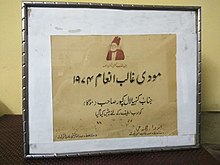Kanhaiya Lal Kapoor
This article, Kanhaiya Lal Kapoor, has recently been created via the Articles for creation process. Please check to see if the reviewer has accidentally left this template after accepting the draft and take appropriate action as necessary.
Reviewer tools: Inform author |
 Comment: Where are the independent sources? We have no interest in what his own website says. Theroadislong (talk) 15:49, 6 October 2019 (UTC)
Comment: Where are the independent sources? We have no interest in what his own website says. Theroadislong (talk) 15:49, 6 October 2019 (UTC)
 Comment: Facebook and Pinterest are not reliable sources. Theroadislong (talk) 06:54, 2 October 2019 (UTC)
Comment: Facebook and Pinterest are not reliable sources. Theroadislong (talk) 06:54, 2 October 2019 (UTC)
Kanhaiya Lal Kapoor.[1](کنہیا لال کپور)[2] also known as K.L Kapur (June 27 1910 – 05 May 1980) was an Urdu satirist known for his sharp wit, ironical style and derisive parodies. [3]. He got fame for his unique writing style and natural talent as a result he was awarded the Ghalib award in the year 1974 by then President of India Dr. Fakhruddin Ali Ahmed for his outstanding contributions to Urdu literature[4]
Biography
Early life
Kapoor was born in undivided India in Lyallpur (now Faisalabad) a part of Pakistan. He finished his Primary education in a local school where he got a chance to learn Farsi language. He completed is metric from Kamalia goverment school in 1928. He completed his Bachelor of Arts from DAV college Lahore. There he was found to be excellent in English and Sanskrit and he chose English as a choice for doing his Master of Arts. He completed his Master of Arts in the year 1934. During his M.A he got married to Srimati Pushpavati in the year 1931.
Expanded description
During his admission in Master of Arts he was interviewed by Patras Bokhari , one of the foremost humorists of Urdu and on seeing him he said "Are you normally this tall or you have made special arrangement for this interview ?" Since he was 6.5 feet tall.
Patras Bokhari was impressed by Kapoor's wit and humor and encouraged him to write in Urdu. He was also a fan of Krishan Chander when he was informed that he lives in same hostel. Inspired by them he started writing Urdu satires. Infact his first parody was on Krishan chanders Yarkan, which Krishan chander liked but he never published that.
Before partition he worked as a lecturer in D.A.V college Lahore from 1934 to 1947. After partition he left Lahore migrated to Ferozpur and then Moga in Punjab where he was appointed as lecturer in 1947 and retired as a principal of DM College in Moga. He served as a principal from 1964 to 1973. He was also a Founding member and principal of AD College in Dharamkot(Moga) from 1973 to 1975 before he moved to Jalhandhar in 1978 and then Poona from 1979 to 1980.He continued his writings in form of Urdu satire and writing columns in Punjab Kesari and Hind Samachar.
Kapoor, along with Shafeeq-ur-Rahman, is one of Urdu’s prominent parodists. His other parodies include ‘Saleem and Anarkali’[5], ‘Chaar malangon ki daastaan’, ‘Jaana Hatim Tai ka’ and ‘Mir ki shaeri ka nafsiyaati tajzia’. In these parodies, he mostly satirised the writers and literary trends of Urdu. But his ‘Urdu adab ka aakhri daur’ (the last era of Urdu literature) is a parody of Muhammad Hussain Azad’s famous work Aab-e-hayat. Progressive poets and writers often became the butt of his satire and his article ‘Comrade Sheikh Chilli’ is a good example of it.
Some of his famous works include Urdu: Sango-o-Kisht[6] (1942) , chang-o-rubab[7] (1944) , sheesha-o-teesha[8] (1946), Nae-Shugoofay [9](1988), Bal-o-par[10] (1954) , Gard-eKarwan[11] (1960) , Gustakhiyan [12] (1965) . Some of his notable comedy Hindi books include Hasya-chalisa (1966) and commorade sheikh chilli (1968)
Some of his Punjabi books include Dekh kabira roya (1973) , Bhul-Chuk (1967), Moge Di Muskaan and Til-Phul(1964)
Death and afterward
K.L Kapoor passed away in Poona, Maharashtra India following a cardiac arrest on 05th May 1980[4]. His teachings are still being followed as a part of curriculum in many universities [13]. Many of his works are also being revisited at this time.
Honours, decorations, awards and distinctions

Honored by Ghalib Award in the year 1974 (Refer Certificate below).
Bhasha Vibhaag (Govt of Punjab) has also an award dedicated in name of him known as kanhaiya lal Kapoor Award (Reference in Section About Anant singh Kabli) in honour of him.This is award for urdu books written and published in Punjab.
K.L Kapoor park in Moga honour of him in year 1982.
Biographies and Books on K.L Kapoor
Kanhayya-lal-kapoor-Hayat-O-Khidmat by Dr Nazim Nihal
Kapoor Nama by Dr Haroon Usmani.
Urdu-tanz-o-mizah-ka-krishn-kanhaya:kanhaya-lal-kapoor by Dr Haroon Usmani
Published works, References and Notes
- ^ Parekh, Rauf (2015-05-18). "Literary notes: Kanhaiya Lal Kapoor and his satirical writings". DAWN.COM. Retrieved 2019-09-03.
- ^ "Prose-2 (About the Author)". www.ncpul.in. Retrieved 2019-09-03.
- ^ "In 'I Have Done My Bhartiya-karan', Kanhaiyalal Kapoor asks what it takes to become Indian - Firstpost". www.firstpost.com. Retrieved 2019-09-03.
- ^ a b "Kanhaiya Lal Kapoor - Profile & Biography". Rekhta. Retrieved 2019-09-03.
- ^ "JSTOR: Kanhaiyalal Kapoor".
{{cite web}}: CS1 maint: url-status (link) - ^ "Sang-o-Khisht by Kanhaiya Lal Kapoor". Rekhta. Retrieved 2019-09-03.
- ^ "Chang-o-Rubab by Kanhaiya Lal Kapoor". Rekhta. Retrieved 2019-09-03.
- ^ "Sheesha-o-Teesha by Kanhaiya Lal Kapoor". Rekhta. Retrieved 2019-09-03.
- ^ "Nae Shugoofay by Kanhaiya Lal Kapoor". Rekhta. Retrieved 2019-09-03.
- ^ "Baal-o-Par by Kanhaiya Lal Kapoor". Rekhta. Retrieved 2019-09-03.
- ^ "Gard-e-Karwan by Kanhaiya Lal Kapoor". Rekhta. Retrieved 2019-09-03.
- ^ "Gustakhiyan by Kanhaiya Lal Kapoor". Rekhta. Retrieved 2019-09-03.
- ^ "India-university-syllabus-urdu".
{{cite web}}: CS1 maint: url-status (link)
External links
https://www.dawn.com/news/1182606 by Dr Rauf Parekh
https://www.rekhta.org/poets/kanhaiya-lal-kapoor/profile
Further Reading
https://www.rekhta.org/Authors/kanhaiya-lal-kapoor/ebooks
Language and Literature: Divers Indian Experiences
Encyclopaedia of Indian Literature
Article (Urdu) by Mirza Nadeeb
Article (Hindi) by RaajKumar Keswani
http://www.ncpul.in/urdu/Anthology/Prose/Prose-2/About%20the%20Author.html (Urdu Article)
Urdu Siasat News paper Artcile (Urdu Article)


